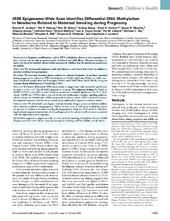450K epigenome-wide scan identifies differential DNA methylation in newborns related to maternal smoking during pregnancy
Joubert, Bonnie R.; Håberg, Siri Eldevik; Nilsen, Roy Miodini; Wang, Xuting; Vollset, Stein Emil; Murphy, Susan K; Huang, Zhiqing; Hoyo, Cathrine; Midttun, Øivind; Cupul-Uicab, Lea A; Ueland, Per Magne; Wu, Michael C; Nystad, Wenche; Bell, Douglas A; Peddada, Shyamal D; London, Stephanie J
Peer reviewed, Journal article
Published version

Åpne
Permanent lenke
https://hdl.handle.net/1956/12165Utgivelsesdato
2012-10Metadata
Vis full innførselSamlinger
Originalversjon
https://doi.org/10.1289/ehp.1205412Sammendrag
Background: Epigenetic modifications, such as DNA methylation, due to in utero exposures may play a critical role in early programming for childhood and adult illness. Maternal smoking is a major risk factor for multiple adverse health outcomes in children, but the underlying mechanisms are unclear. Objective: We investigated epigenome-wide methylation in cord blood of newborns in relation to maternal smoking during pregnancy. Methods: We examined maternal plasma cotinine (an objective biomarker of smoking) measured during pregnancy in relation to DNA methylation at 473, 844 CpG sites (CpGs) in 1, 062 newborn cord blood samples from the Norwegian Mother and Child Cohort Study (MoBa) using the Infinium HumanMethylation450 BeadChip (450K). Results: We found differential DNA methylation at epigenome-wide statistical significance (p-value < 1.06 × 10–7) for 26 CpGs mapped to 10 genes. We replicated findings for CpGs in AHRR, CYP1A1, and GFI1 at strict Bonferroni-corrected statistical significance in a U.S. birth cohort. AHRR and CYP1A1 play a key role in the aryl hydrocarbon receptor signaling pathway, which mediates the detoxification of the components of tobacco smoke. GFI1 is involved in diverse developmental processes but has not previously been implicated in responses to tobacco smoke. Conclusions: We identified a set of genes with methylation changes present at birth in children whose mothers smoked during pregnancy. This is the first study of differential methylation across the genome in relation to maternal smoking during pregnancy using the 450K platform. Our findings implicate epigenetic mechanisms in the pathogenesis of the adverse health outcomes associated with this important in utero exposure.